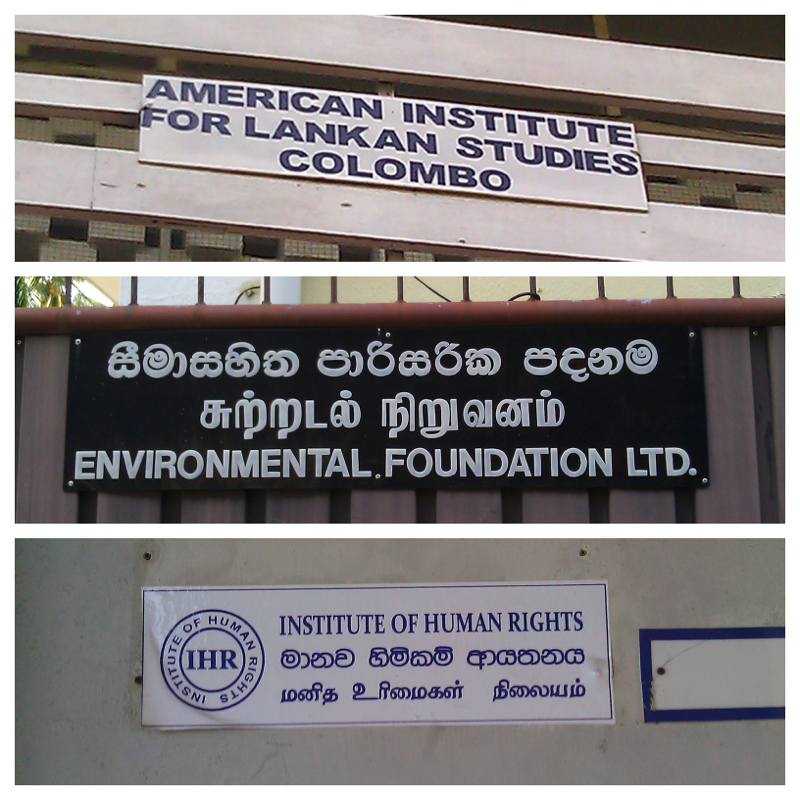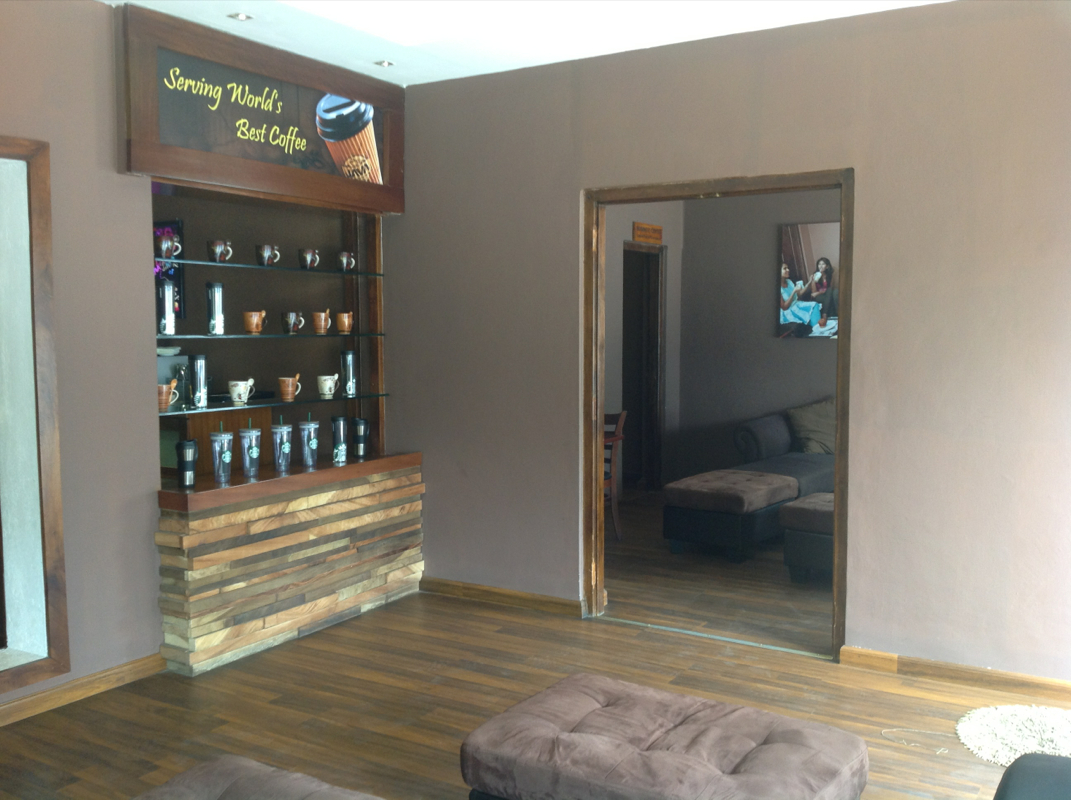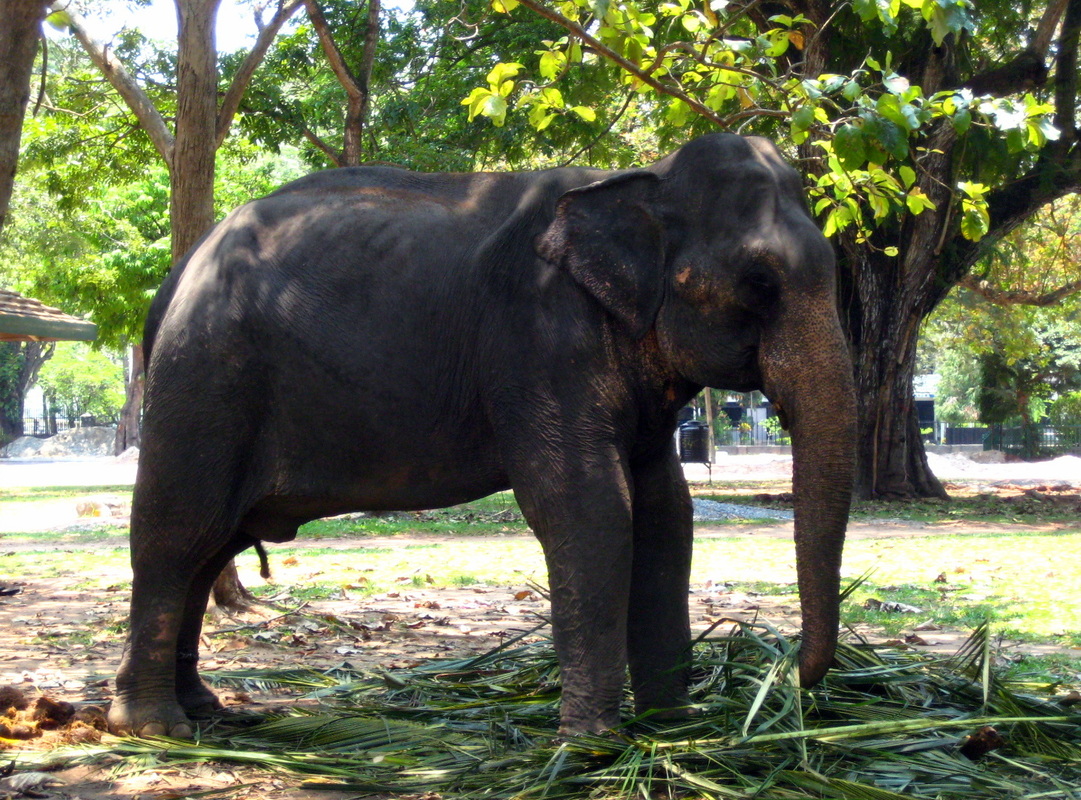I began by heading downstairs to the Coffee Spot where I picked up my delightfully strange bagel with lox and cream cheese imbued with a certain European flare for having been toasted in a panini press (it looked like a circular crinkle cut fry). Then I set out for the American Institute for Sri Lankan Studies (AISLS), a research organization with whom I had been in contact prior to arriving in Colombo. There I finally met face-to-face with Mrs. Ira Unamboowe, Executive Director of AISLS and warm and dedicated guide, who helped me navigate the unfamiliar territory that is Sri Lanka by providing me with contacts and setting up meetings. We talked and strategized for about an hour, during which time she made phone calls which enabled me to secure additional interviews. Given my time constraints and the fact that there are not one but two national holidays this week, I would not have been able to schedule as many interviews as I have without the assistance of virtual strangers and I am fortunate that so many people, such as Mrs. Unamboowe, have been willing to help me, a graduate student from a university somewhere in California not called Los Angeles or Berkeley. Mutually we agreed that my best course of action for the day would be to visit Environmental Foundation Limited (EFL), an environmentally-focused public interest law organization, gather what literature and contacts I could from there, and make my way to my interview later. Luckily for yours truly, EFL was located within walking distance from AISLS, which pleased, to no small extent, both my feet and my desire to remain dry, or at least drier than I had been during my epic walk from Colombo 08 back to my hotel the previous day.
The tinkering I had done with Google maps while at AISLS indicated that EFL was only a few short blocks away. Early on in my walk I crossed paths with a notable coffee shop, and, given that the heat was already at full tilt, I opted to pick up a cool beverage before formally attacking the uneven pavement to find EFL. After managing to cross the street unscathed, I entered a coffee shop that stood as a symbol of the level of development and cosmopolitanism Colombo aspires to achieve. Though named Java Lounge, this establishment proudly served Starbucks coffee and was decorated more like Central Perk of Friends fame than anything remotely cognizable as Sri Lankan. I ordered an iced coffee. To my chagrin, somehow during the ordering process our communication was severed, leaving me with not a soothing, icy glass of joe, but a piping hot cup of coffee in a ceramic mug. Not wanting to press the matter further, I simply imbibed my hot drink on a hot day, which was easier than it sounds as JL was air-conditioned to abusive Western standards. Fully caffeinated, I ventured back out into the unforgivably hot tropical world and followed the simple directions I had written down in my notepad.
After following my directions precisely, I stood at the corner of Thimbirigasyaya and Spathodea Avenue, perplexed. Where was Havelock Road? I asked a couple guards for help, and they pointed me in the opposite direction from where Google maps had commanded me to go. Street numbers were curiously absent from most building facades, but one building which did feature a number led me to a kind of dirt road where, presumably, I would find the EFL office. Again I inquired with a guard who lackadaisically controlled the traffic going in and out of the residential side street. He informed me that the location I sought was indeed directly down the road he manned. I walked about 50 feet until I saw the sign, in English and Sinhala, for "Environmental Foundation Ltd." I passed through the threshold into a dim and open sauna of an office, staffed almost exclusively by women. Immediately I was faced with the awkward situation of having to deliver an entirely unrehearsed solicitation for assistance. What, do graduate students not just randomly pop in off the street into NGOs in the developed world? In this line of work, one needs to be humble and realize that when asking for help you are totally at the mercy of what is likely to be a complete stranger, so manners function as an important form of currency. In my case, a young lawyer, Ms. Lakmini Amarasinghe, offered to speak with me about my research. Although we experienced a bit of difficulty communicating, the essence of my project and request for contacts and/or resources was conveyed clearly. In fact, I landed a major document- "Your Environmental Rights and Responsibilities: A Handbook for Sri Lanka." At first Ms. Amarasinghe agreed to let me photocopy page 11, "Sri Lankans constitutional right to a healthy environment," (Note: To properly analogize the importance of this section to my research, this single page is nearly equivalent to having someone you asked out on a date but who rejected your advance explain to you that he/she was currently seeing someone at the time you asked, satisfying your thirst for an explanation and weakening any residual stinging sensation) but upon further consultation with another staff member she agreed to let me keep the whole coffee table-sized bilingual reference tool. I expressed my extreme gratitude for her organization's charitable contribution to my dissertation (unfortunately not tax-deductible due to incommensurable tax codes) and left to find lunch.
As I proceeded down the block, however, I came across a sign, partially obstructed by a much larger sign for a bank, that read, "Institute of Human Rights." Although no one I had been in contact with mentioned this particular organization, I thought I might as well check it out and see if they, too, can offer any assistance. I cut off a car that was slowly turning into a car port, and started up the stairs to the second floor, where IHR was located (I seem to recall it actually being on the third floor, but I digress). I advanced down a kind of breezeway and approached the office. Fear flowed into my brain like a a cloud of poison. Just outside the office, hundreds of documents and binders were strewn about haphazardly. From what I could see of the office itself there was no office furniture, just several people in plain clothes milling about. I was hoping to learn that the place had been robbed, and that all of their expensive office equipment had disappeared along with their Herman Miller chairs (there was a Herman Miller store not too far away from the place). At least that might explain the condition of this official-sounding organization. Again I entered the room unannounced and explained who I was and what the hell I was doing standing in an otherwise vacant room with a bag slung over my shoulder and the reddish, sun-impacted skin pigmentation of a non-native. The director of the office had a staff member pull over a plastic lawn chair next to hers. It was devastating to see a human rights organization in such a state of utter disarray. It seemed like to operate under such conditions would certainly qualify as a violation of a second generation human right. The woman heading the institute apologized for the appearance of the office. They were currently in the process of moving to another location, and everyone came in that day to help transport things. A wave of relief crashed over me. We chatted for a few minutes, and the woman provided me with the names of a few people she thought I should contact given my interests. Realizing I was in the middle of an ongoing process, I thanked everyone for their time and descended the stairs leading back out to the street-level carport.
Success and caffeine powering my step, I decided to have lunch at an eatery frequented by locals, so I turned into Sen Sal, a popular café. The entryway was quite cramped; multiple queues formed in front of three different counters (hot food, bakery, and salads/coffee). I shifted about constantly as I stared into the glass case at the bakery counter. Ultimately I settled upon two curried chicken pastries and a 7-Up, which set this traveler back all of about $2. With just enough food to keep me placated until dinner, I returned to the roads.
The time at which my next interview was scheduled to commence drew near, so I hailed a trishaw to take me to Citizens' Trust in Rajagiriya, where I would meet with Ms. Ruana Rajepakse, a well-known environmental lawyer. Due to a clerical error on my part, my cab driver went up and down Nawala Road in search of a mysterious address. We must have stopped to ask for directions from random off duty cab drivers and roadside vendor attendants 5 or 6 times. Meanwhile, my fare kept going up, the final grains of sand emptied from the top of the hourglass, and yet we were still lost. Finally we arrived at what appeared to be a house with a number very close to the one I needed to find. My cabbie asked another driver outside the place where we might find the address I had listed in my notebook. Eventually the second driver called out to someone standing on the porch on the second floor of the house. Then I heard the sound of gentle footsteps respectfully meeting ceramic tiles until the white metal door at the front of the house opened carefully and a woman emerged. It was Ms. Rajepakse. She apologized and informed me that she was currently busy. But, if I was willing to wait, she could see me when she was done. Having nowhere else to go at that point, I agreed. I went upstairs to sit outside her office while she conducted a consultation with a client. In the meantime, she handed me a copy of her book, "A Guide to Current Constitutional Issues in Sri Lanka." It would be an early Sri Lankan Hanukkah for me. Patiently I sat out on the porch where I became acquainted with the history of constitutional law in Sri Lanka and Ms. Rajepakse's dog. About 45 minutes later, everyone had cleared out, including Ms. Amarasinghe, whom I had met earlier that day at EFL. I waved hello and she smiled in return. Finally Ms. Rajepakse invited me in, and offered me a glass of grape juice. Given the temperature and having been outdoors for a while at that point, I gladly accepted. Slender and soft- but very well-spoken, Ms. Rajepakse discussed the constitution and the issue of environmental rights in Sri Lanka with me while her docile dog hugged the cool ground to the right of my chair. The interview ended and I walked down the stairs and followed the snaking path of the residential street to a trishaw stand where I quickly secured a ride back to my hotel.
That night I made plans to eat dinner with César Hernández, a friend of a colleague's at UC Irvine, and currently a lecturer in the School of International Relations at the University of Colombo. We agreed to meet at Sri Manika Vinayagar Kovil, a Hindu temple. Having had fun riding in the trishaws earlier that day, I decided to take another one to our meeting spot. I hopped in one of the little red tricycle golf carts right around the corner from my hotel and instructed the driver where I wanted to go. I don't know what it is about me and getting ripped off on the way to religious sites, but it seems to be a recurring theme during my time in Sri Lanka. I realized almost instantly that the meter for the cab fare was not on. Yet, I rationalized that it probably wasn't necessary because it was at night and they must charge a flat fee or something like that (I can't believe I basically came to a rationalization of why I would be taken for a ride, literally and figuratively, instead of being more suspicious, but I guess that's my Western optimism (read: naïveté) shining through). When we came to the temple, my driver wanted somewhere between 100 LKR and 1000 LKR, but he didn't specify. I told him I would have to break my 2000 LKR bill, so we drove away from the temple and to a convenience store down the road, where he told me to get the bill changed. I asked the cashier to change my bill and, after discussing it with what I presumed to be his superior, he told me he could only break it down into two 1000 LKR bills. I came back to the trishaw with two smaller bills this time and was met by the displeasure of my cab driver who proceeded to drive me to another store where I could get my bills broken down even further. But, bless his heart, my driver finally relented, and he offered to let me pay with one of the 1000 LKR bills in exchange for the 3 miles traveled (to put this in perspective, I paid 880 LKR once during this trip from Colombo 08 in the far eastern reaches of the city all the way back to my hotel in Colombo 03). Personally disappointed and 1000 LKR poorer, I walked to the Hindu temple to meet César. Standing outside, César greeted me right away. We talked about what had just happened as I removed my shoes and we washed our feet to enter the temple. It became apparent to me through our discussion that staying in a nice hotel actually introduced new problems into my field research experience that I had not anticipated at all. Who knew that my staying at a higher end hotel I would be trading safety from contracting dengue fever for being ripped off habitually by trishaw vultures? As we talked, we game planned for how I could avoid getting had in the future. Mainly, I learned that I should never take a trishaw from anywhere in the immediate vicinity around my hotel. When someone sees you walking out of a fancy hotel, you are instantly an easy mark. It's a kind of unfortunate stigma that follows you, as if you are hemorrhaging money into the ocean waters where trishaw sharks lay and wait to tear into your wallet. In addition, this means getting dropped off at places outside the hotel and just walking to the hotel once you have paid your fare and left the vehicle. This whole experience is really depressing because it is indicative of what's going on in the country (and even the region) as a whole. Corruption, not democracy, is the true form of governance in places like this. Political leaders drunk with power are enabled by a populace that is unaware of the level of abuse present or unable to force a change in the ruling faction in place or both. With little oversight and substantial pensions, government workers simply bide their time until the grand payday is upon them. At the lower levels of society, people like my cab driver care not about national pride or trying to improve their country. Instead, they would rather rip off a foreigner who is providing the country with money through tourism. I truly want to believe that people will do good if left to their own devices, but my experiences and conversations so far dictate otherwise. At any rate, my confidant and I sat and talked until we were ushered out of the temple, at which point we went across the street to dine at Amirthaa, a vegetarian restaurant. At the street level of the restaurant a large menu lay plastered against the wall. César explained the menu to me and we went up the stairs to the dining room. Once there, both of us washed our hands in a kind of communal sink basin and they were left to dry in the muggy upstairs jungle night air. We ordered an assortment of dishes, all to be set upon wax paper wrapped around a metal plate and eaten by hand with the aid of a kind of pancake called dosai, which came in an assortment of flavors. The dosai had an appearance and texture that inspired mental comparisons to a Dutch pancake and Ethiopian injera, although less spongy than the latter. The dishes ranged in terms of their spiciness, some so spicy that I feared I would consume my entire skinny bottle of Coke Classic before finishing a portion of my meal. César and I exchanged war stories from the front lines of academia and had our worries overpowered by the raw heat of curries and chillies. We settled the bill and said our goodbyes downstairs. I felt happy to have had dinner with someone, as so far on my trip I have been alone at every meal.
Thunder rang sharply and the skies began to open up again. I walked back to my hotel 3 miles north in drizzling rain, throwing a wave to the colossal fortress that is the United States Embassy as I scuttled past. Once I got to my hotel I sauntered over to Coffee Spot where my day had begun. I ordered a vanilla milkshake. I felt I had earned it.



 RSS Feed
RSS Feed